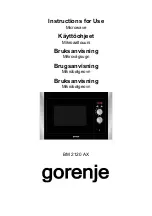
33
FOOD HANDLING & PREPARATION (Continued)
Composition
& quality
Piercing
Arrangement
Covering
Size & shape
Density &
quantity
Hygiene
Food high in fat or sugar (Christmas pudding, mince
pies) requires less heating time and should be
watched, over-heating can lead to fire.
Use good quality ingredients for microwaving.
Economical cuts of meat can be used for casseroles.
Food with skin (e.g. potatoes, apples, fish,
sausages, chicken), or with membrane
(e.g egg whites/yolks), must be pierced in
several places before cooking or reheating.
If not, steam will build up and may cause
food to explode. When cooking eggs using
“Auto cook 6, Breakfast”, it is not necessary
to pierce the yolks, as the programme uses
grill only.
Canned potatoes should not be heated in the
microwave oven as they might burst.
Place thickest parts of food on the outside of the dish,
e.g. place meaty ends of chicken drumsticks on the
outside of the dish.
Fish, vegetables and certain other foods benefit from
being covered during microwave cookery, follow
recommendations where given and use vented
microwave cling-film or a suitable lid.
Food size and shape affects the amount of cooking time
needed. When cooking more than one portion of the
same food ensure they are of a similar size and shape.
Food density and quantity affect the amount of
cooking time needed, for example, potatoes require
more cooking than peas; four potatoes will take longer
to cook than two.
Food hygiene standards (storage, handling and
preparation) apply to microwaving. Always store
convenience foods as recommended by the food
manufacturer and keep no longer than the "Use By" date.
Do not cook eggs in their shells, whole hard-
boiled eggs should not be cooked in
microwave ovens since they may explode
even after microwave cooking has ended.
















































